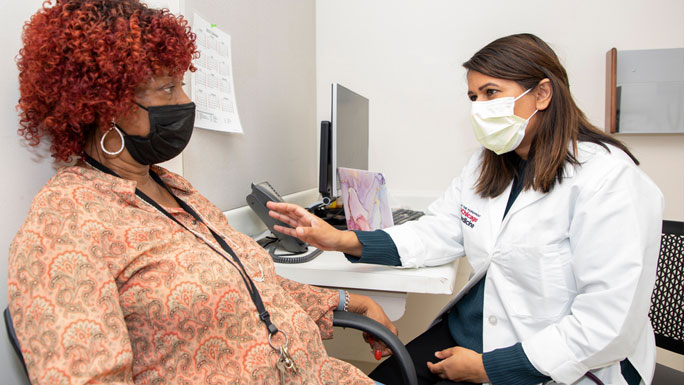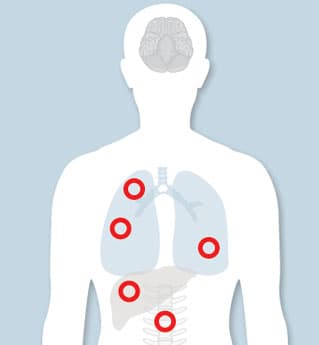Appendix Cancer

Cancer of the appendix affects fewer than 2,000 people in the U.S. each year. Because it is a rare type of cancer, it’s important for patients to get care from physicians who are highly experienced in treating this disease.
Guided by the latest research and advanced techniques, UChicago Medicine’s multidisciplinary appendix cancer care team works together to offer compassionate care and leading-edge treatments to patients. We are among just a few centers offering hyperthermic intraperitoneal chemoperfusion (HIPEC) for the treatment of appendix cancer.
Cancer of the appendix can occur in teens, young adults and adults. Tumors in this small organ can be malignant (cancerous) or benign. The treatment and prognosis vary greatly, depending on the type of appendix cancer and whether it has spread.
Carcinoid tumors (also called neuroendocrine tumors)
About 50 percent of appendix cancers are carcinoid, or neuroendocrine tumors. These tumors are usually small and often can be treated with an appendectomy (removal of the appendix). In some cases, more extensive surgery may be necessary. Carcinoid tumors of the appendix are most often seen in women who are in their forties.
Adenocarcinomas
Adenocarcinomas in the appendix tend to be aggressive, spreading to lymph nodes and traveling — a process known as metastasis — to other parts of the body.
In some cases, a patient may be diagnosed with a hybrid of a carcinoid and an adenocarcinoma (called goblet cell carcinoid or ex-goblet adenocarcinoma). This tumor has a high propensity to metastasize.
Pseudomyxoma peritonei (PMP)
This rare type of appendix cancer usually begins in the inner lining of the appendix and can spread into the abdomen. PMP appendix cancer is seen in both men and women who are in their fifties.
Appendix cancer is hard to detect and is often found by accident. In some cases, the tumor causes painful inflammation of the appendix (acute appendicitis) and is found during the appendectomy. In other instances, a suspicious mass may be seen by a radiologist when a patient has a scan for a different condition.
When appendix cancer spreads to other parts of the body, it may cause some of these symptoms:
- A feeling of fullness or bloating in the abdomen
- Slight discomfort, chronic or acute pain in the abdomen
- Discomfort in the pelvic area
- Bowel obstruction
- Diarrhea
- Ovarian mass
- Shortness of breath
- Loss of appetite
- Hernia
These symptoms may also indicate a different health problem. If you experience any of these symptoms, it is important that you discuss them with your doctor.
Early stage appendix cancer may be found during surgery for acute appendicitis or when tests, such as a CT scan, are done for another condition in the abdominal area.
If you have symptoms that could be related to advanced appendix cancer, your doctor will do a full medical exam and may order the following:
- Blood test
- Urine screen
- Imaging tests, such as CT, MRI and/or PET scans
If appendix cancer is suspected, the mass is removed and examined by a pathologist to determine if abnormal or cancerous cells are present. When a diagnosis is made, doctors will determine the cancer’s stage based on the tumor’s size and whether it has spread.
What are the treatments for appendix cancer?
A treatment plan for appendix cancer depends on the type and stage of the tumor and the patient’s overall health. Effective treatment of appendix cancer –– which may include surgery and chemotherapy –– should be planned by a medical team experienced in the management of this type of cancer.
In addition, our Supportive Oncology program provides holistic services to improve quality of life while undergoing treatments for appendix cancer.
Appendectomy. An appendectomy is the surgical removal of the appendix. It is usually the only treatment needed for an appendix carcinoid tumor that is smaller than 1.5 centimeters and has not spread to other organs.
Hemicolectomy. For a carcinoid tumor larger than 2 cm or appendix cancers that are not carcinoid, a hemicolectomy may be recommended along with the appendectomy. During a hemicolectomy, the surgeon removes the appendix along with a nearby portion of the colon. Blood vessels and lymph nodes in the area may also be removed.
Cytoreductive surgery. For later-stage appendix cancer, cytoreductive surgery may be performed. During this procedure, the surgeon removes almost all visible cancer. Often, cytoreductive surgery will be combined with HIPEC to destroy any remaining cancer cells. One of the components of cytoreductive surgery includes expertise in peritonectomy. This technique removes the peritoneal lining (the lining of the abdomen), a process that is similar to removing wallpaper or paint off the walls of a room.
Chemotherapy is the use of drugs to destroy cancer cells, usually by stopping the cancer cells’ ability to grow and divide. When appendix cancer has spread, your oncologist may recommend chemotherapy:
- Systemic chemotherapy enters the bloodstream to reach cancer cells throughout the body. This can be done using an intravenous (IV) tube, or in a pill or capsule that is swallowed. Chemotherapy for appendix cancer may be given before and/or after surgery.
- Hyperthermic intraperitoneal chemotherapy (HIPEC) is a one-time treatment given directly into the abdominal cavity. During HIPEC, a powerful dose of heated chemotherapy medication is pumped into the patient’s abdomen after cytoreductive surgery. This “chemo bath” circulates throughout the abdominal area, directly targeting cancerous cells.
Radiation therapy is not a common treatment for appendix cancer. In some cases, it is used treat a particular area when the cancer has spread to other parts of the body, to help relieve symptoms.
What is the prognosis for appendix cancer?
Fortunately, many patients can be treated effectively or cured of appendix cancer.If the cancer does return, it may come back in the same place (called a local recurrence), nearby (regional recurrence), or in another place (distant recurrence). When the cancer relapses, your medical team at UChicago Medicine will work together to personalize your treatment plan.
What is happening in research for appendix cancer?
The physicians and scientists at UChicago Medicine are continually exploring new techniques for the detection and treatment of cancer of the appendix. For example, we are working to develop a test that could detect appendix cancer in the blood before it is visible on scans. Our researchers are also working on advanced imaging technologies to detect cancer early.
Treating Metastatic Cancer with Optimism and Hope
If you have been diagnosed with metastatic cancer, more therapies may be available to you than you think. Our cancer specialists are eager to help you understand all of your options.
Limited Metastatic Cancer ProgramHIPEC is an aggressive, targeted surgical technique that attacks abdominal cancer with fewer side effects than traditional chemotherapy.
UChicago Medicine is one of the only hospitals to offer the treatment for both children and adults. How does HIPEC work? First, surgeons remove the patients' tumors immediately following surgery. The patient's abdomen is treated with a heated chemotherapy bathe. The chemotherapy is heated to cause blood vessels to expand and improve the medicines penetration and effectiveness. They heated concentrated dose of chemotherapy can directly target cancerous cells, destroying them before they can become future tumors.
This also means that the chemo stays where it can help the most rather than circulating throughout the body. After about 90 minutes, the surgeons wash out the chemo and close the incisions. We also offer minimally invasive HIPEC to eligible patients. For some patients, HIPEC will achieve a long term cure for their abdominal cancers. In other cases, HIPEC allows doctors to treat incurable cancers more like a chronic disease and less like a terminal illness. HIPEC means hope for patients with abdominal cancer. Need more information about HIPEC? Call 888-824-0200 or go to UChicagomedicine.org/HIPEC. UChicago Medicine is here to help.
[MUSIC PLAYING]

Cancer Care Second Opinions
Request a second opinion from UChicago Medicine experts in cancer care.

Participate in a Clinical Trial
UChicago Medicine appendix cancer experts conduct clinical trials of new and promising treatments.

Why Choose Us for Cancer Surgery?
Our surgeons offer sophisticated techniques, including minimally invasive and robotic options, to treat cancer.
